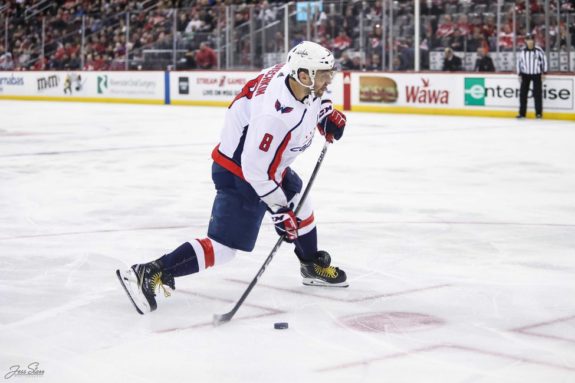On Black Friday, buried under the holiday and pandemic and post-election coverage, the NBA quietly announced their 2020-21 preseason schedule. That helps pave the way for the NHL to return to home arenas in 10 cities — including Washington.

The Washington Wizards will host a pair of preseason games on Dec. 17 and 19 against the Detroit Pistons; they will be held at Capital One Arena.
The two games will be the first events held at the arena since March 10, when the Wizards hosted the New York Knicks and before the league paused after games the next night, with the NHL following suit the next day. The Wizards’ roommates in the building, the Washington Capitals, haven’t had a home game since a loss to the Philadelphia Flyers on March 5. The day the NHL elected to pause, the Capitals were supposed to host the Detrioit Red Wings, but it ended up becoming the first event wiped off the building’s schedule.
With the NBA clearing arenas for use — with no fans in most cases — the NHL can follow suit in nine of the shared buildings except for Toronto, as the Raptors will temporarily share Amelie Arena with the Tampa Bay Lightning instead of playing in Ontario.
NHL, NHLPA Stalled in Talks for Start
Whenever the NHL gets around to setting up the parameters of the 2020-21 season, the pathway is clear for the Capitals to skate on home ice in Chinatown should they want to. However, questions remain about what the season will look like.
While the NHL has been targeting Jan. 1 as a start date, the chances of a New Year’s Day opening are growing more and more remote. There hasn’t been a formalization of plans regarding when the season may begin and the calendar is set to flip to December.
The owners will want as few games as possible to reduce expenses, as the players will get at least pro-rated salaries with mostly only television revenue coming in. The revenue from local and national TV deals account for maybe a third of team’s income, with the bulk coming from ticket sales and other concessions — most of which will be limited this season.
Both the 1994-95 and 2012-13 seasons were reduced to 48 games — that seems like a likely outcome for this upcoming season. The 1994-95 season began on Jan. 20, while the 2012-13 season began on Jan. 19, and concluded in late June. While the root of this delay didn’t start in labor strife — the two sides actually hammered out a new Collective Bargaining Agreement before the playoffs — the latest fight over additional escrow is threatening to push back the start date.
At the core of it is financial issues, as the owners want the players to accept additional escrow payments off their paychecks to soften the financial blow of a shortened season, most of which will be played without fans.
And, of course, the dropping temperatures and rising COVID-19 cases across both the United States and Canada are also creating issues for plans for the season, not only with international borders, but also with U.S. states and Canadian provinces having various restrictions on travel.
Capitals Prepare for the Unknown
Several Capitals, including new goaltender Henrik Lundqvist, have been in informal workouts at MedStar Capitals Iceplex in recent days, with the presumption the more formal steps towards camp will be taken soon. However, a proposal from the NHL to increase escrow payments for the season stalled talks to formalize the season, and with 2021 less than five weeks away, time is of the essence for the two sides to come together.
In the cases of the previous two shortened seasons, play was entirely within the conference, but with the likelihood of an all-Canadian division, to balance out the schedules, there may only be divisional play this year, with some tweaks to the alignment.
While the Metropolitan Division doesn’t have to worry about border issues, the Atlantic Division would be broken up, with the Montreal Canadiens, Ottawa Senators and Toronto Maple Leafs off in a temporary Canadian division. Which means, the northernmost U.S. clubs in the Atlantic — the Boston Bruins and Buffalo Sabres — would probably be grouped in with the core of the Metro, while the Carolina Hurricanes, Columbus Blue Jackets and Pittsburgh Penguins are all potential castoffs to a temporary Central Division.
For the Capitals, that’s a steady diet of the Flyers, New York Rangers, New Jersey Devils, New York Islanders and likely the Bruins and Sabres and perhaps the Penguins or Hurricanes — not an easy grouping with only the Devils and Sabres missing the 24-team bubble bracket.

Washington went just 9-9-2 last season combined against Boston, Buffalo, New Jersey, the New York teams and Philadelphia — the teams almost assuredly going to be sharing a division with the Caps — but holding winning records against Columbus (2-0-1), Carolina (2-1-1) and Pittsburgh (2-1), who may or may not be included in a revamped Metropolitan.
The Capitals would also miss playing the rest of the Atlantic, as they went 11-1-1 against the remaining six clubs not likely to be included in their division, as well as a 16-6-4 against Western Conference opponents.
If it’s 48 games, it would be roughly seven against each opponent, which would be a throwback to days where teams played division rivals six or more times a season — limiting travel but also stoking playoff-type animosity between the clubs.
Washington would be less than 90 minutes flight time from all their opponents in a modified division, and likely play them in baseball-style series with dates built in for adjustments if necessary.
But with the Wizards planning to take the floor at Capital One Arena in December, it’s likely the NHL will follow suit and put games at home rinks rather than hubs to start the season.
Now, the question will be when the NHL and NHLPA come to an agreement, so the league can start setting dates for camps and games and try and start the campaign.